
Missouri House Republicans blocked funding for Medicaid expansion multiple times Tuesday — even though Missouri voters passed the measure in a statewide referendum in August.
Advocates for health care expansion called the move the latest example of political theatrics in the state, while Democratic lawmakers deemed it a threat to the state Medicaid program. The groups agreed that the move was deeply frustrating and noted that it imperiled billions of dollars of federal aid.
Dina van der Zalm, the health care organizer for the Missouri Rural Crisis Center, a progressive nonprofit that advocates for rural communities, called it a “political circus show.”
“We’re hoping cooler heads and hearts will win the discussion in the end, because there’s too much riding on it for Missouri, coming out of a pandemic, to really strip people of health care and then just forfeit all of that money we so desperately needed,” she said.
The state House Budget Committee voted on partisan lines, 20-9, late last week to drop $130 million for Medicaid expansion from the budget of Gov. Mike Parson, also a Republican. The House is expected to pass the budget in the coming days, sending it to the state Senate.
The $130 million would have secured a federal match of about $1.4 billion to pay for the program and bring 230,000 Missourians earning less than $18,000 a year under the health care coverage beginning July 1. The state would also get an additional $1 billion over the next two years to help implement the program.
Now Missourians are left to wonder whether the Legislature will fulfill the will of its voters only by stretching the state’s Medicaid program to the financial breaking point. Because expansion is an amendment to the state constitution, the state will still have to provide those additional 230,000 Missourians with Medicaid coverage — it will just have less money for Medicaid services.
“This is the law of the land: Medicaid now covers all of these populations,” said Democratic Rep. Crystal Quade, the House minority leader. “Now it’s a question of how much money the Legislature chooses to put in there. But if we don’t do this, it could end up costing the state even more.”
Parson, who opposed Medicaid expansion previously, said he would move forward with implementation after voters supported the referendum measure, although he has remained quiet since House Budget Committee Chair Cody Smith began his push last week to strip the governor’s budget of the funding. Smith claimed Missouri could not afford to pay for expansion.
Neither Parson or Smith responded to requests for comment.
Instead, Smith committed the funding to other social service programs — mental health, addiction programs, school transportation and the state’s public defenders’ office, among others — insisting that the state had to choose his priorities or expansion.
Experts said it was a false choice, citing the state’s higher-than-expected revenue and the additional Covid-19 relief it will soon get from the federal government, including $2.5 billion in general aid and the $1 billion it will receive if it follows through with Medicaid expansion.
“We’ve got significant resources available to support implementation of expansion,” said Amy Blouin, the president and CEO of the Missouri Budget Project, a nonprofit that analyzes the state’s budget and policy priorities. “We also know, because time and again other states have shown us, that Medicaid expansion results in state budget savings and increased tax revenue because of jobs it creates in the health care industry.”
Advocates, lawmakers and other Missourians said they feel they have been hung out to dry as they watch for Republican political maneuvering in the state capital in the coming weeks.
Many said they are optimistic, however, that the governor and the Republican-controlled Senate, where GOP members have endorsed the program, will be able to fix the budget and defend Missourians’ support of expansion.
“We’re talking with partners in the Senate to really try and make sure that they move forward with funding the program,” said Angela Brown, the CEO of the St. Louis Regional Health Commission. “That’s where we have hope that it doesn’t have to come back and become a big fight — because, you know, the people voted.”
Rep. Peter Merideth, the ranking Democrat on the Budget Committee, said he was slightly concerned that Senate Republicans would not try to bring back the funding.
“The big question to me is how many moderate Republicans in the Senate are willing to spend political capital to get this thing through,” Merideth said, “especially when they’re looking at redistricting and looking at runs for different offices — statewide offices — and thinking to themselves, ‘How do I best position myself to run in a Republican primary?'”
Still, many expressed frustration at what they deemed to be unnecessary political drama, especially after Missouri cemented its support for expansion in the state constitution.
In a referendum in August, Missourians — who would go on to support Donald Trump in the presidential election by more than 15 percentage points — supported expansion by 53.3 percent to 46.7 percent.
Recent polling shows that voters’ support for the Legislature to expand Medicaid continues to grow. About 65 percent of voters supported implementation, with only 26 percent in opposition, in a January poll commissioned by the Missouri Hospital Association. Eighty-eight percent agreed that it is the Legislature’s “sworn duty to listen to the will of voters and implement the expansion.”
“There continues to be people playing out the political wars of the last decade,” said Richard von Glahn, the organizing director of Missouri Jobs with Justice, a progressive labor group that pushed for Medicaid expansion. “But I think it’s clear that Missouri voters have moved past this and just want the right thing to happen for our state.”
Source: | This article originally belongs to Nbcnews.com










